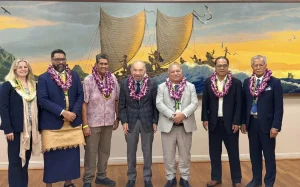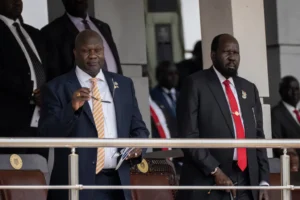As Abuja approaches its 50th anniversary in 2026, Nigeria’s Minister of the Federal Capital Territory (FCT), Barr. Nyesom Wike, has announced plans for what he describes as an unprecedented infrastructure revolution that will redefine the city’s urban identity and economic potential.
Speaking during the flag-off of the construction of Collector Road CN2 (Emmanuel I. Ogala Street) from Arterial N16 (Yemi Osinbajo Way) to N20 (Wole Soyinka Way), including Road ILS 5 within Katampe District, Wike said Abuja is poised to experience a level of development never witnessed since its establishment.
He stated that under the administration of President Bola Ahmed Tinubu, the FCT is witnessing renewed momentum in infrastructure expansion, designed to enhance connectivity, attract investment, and improve the city’s livability.
“Abuja people, God has blessed us through Mr. President. Next year will be a different year altogether. We will see the massive infrastructure turnaround of the FCT — something nobody has seen since its creation, which will be 50 years by February 2026,” Wike said.
The minister revealed that the Katampe project is among several developments earmarked for commissioning during the third anniversary of President Tinubu’s administration. Other major projects include water supply systems in Karu, Karshi, Orozo, and Bwari, as well as the dualisation of the Outer Southern Expressway (OSEX) from Apo to Wassa, spanning about eight lanes.
Wike emphasized that these interventions are not merely cosmetic but strategic investments to strengthen Abuja’s role as a hub of governance, commerce, and culture. He urged residents and community stakeholders to support contractors and ensure the smooth execution of ongoing works.
“There will be sabotage just to distract us and weaken us. But I can assure you, I and my team are very determined. Once you are alive, there will be a fight. It’s only the dead that don’t fight,” he added.
A Global Context: Urban Renewal and Africa’s Emerging Capitals
Abuja’s planned infrastructure turnaround reflects a wider continental trend of African capitals reimagining their urban futures. Across the continent, cities like Kigali, Nairobi, and Accra are investing heavily in modern infrastructure, sustainability, and digital connectivity to compete on the global stage.
For Nigeria, Abuja’s transformation at 50 symbolizes more than physical renewal — it represents a broader national vision to align its capital city with global urban development standards, fostering economic resilience and improved quality of life for its residents.
As the FCT prepares for its golden jubilee, the Wike-led administration’s ambition places Abuja firmly within the global conversation on inclusive, sustainable, and future-ready cities.











